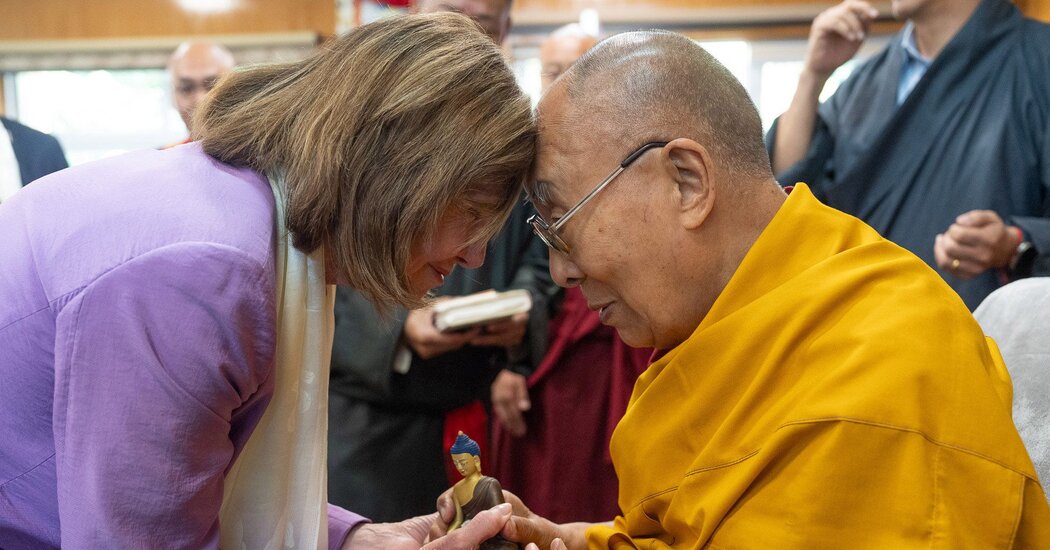
A high-level U.S. congressional delegation, including the former House speaker Nancy Pelosi, met with the Dalai Lama at his Indian home on Wednesday, a visit that was condemned in advance by China’s government, which considers the exiled Tibetan spiritual leader a separatist.
The delegation, led by Michael McCaul, the Republican chairman of the House Committee on Foreign Affairs, arrived on Tuesday in the Himalayan town of Dharamsala, where the Dalai Lama has lived since the 1960s. The delegation visited the offices of the Tibetan government in exile, which is pushing for autonomy for Tibet within China.
The trip comes days after Congress passed a bill with bipartisan support that urged China to start dialogue with Tibetan leaders to find a solution to the longstanding conflict.
China’s criticism of the visit was immediate and unsurprising. Its leaders consider the government in exile illegal and regard any support for the cause of autonomy for Tibet, which they call Xizang, as interference in internal Chinese matters.
“We urge the U.S. side to fully recognize the anti-China separatist nature of the Dalai group, honor the commitments the U.S. has made to China on issues related to Xizang, stop sending the wrong signal to the world,” the Chinese Embassy in New Delhi said in a statement on Tuesday night.
At a public function on Wednesday after the meeting with the Dalai Lama, Mr. McCaul said Chinese officials had sent the delegation a letter “warning us not to come here.” He said the United States stood with Tibet in what he called its right to self-determination. “America, the beautiful, will support Tibet to remain a powerful force as always,” he said.
U.S. officials have often met with the Dalai Lama, 88. Ms. Pelosi’s presence in the delegation, however, brought reminders of her 2022 trip to Taiwan, the self-governing island that China claims as its territory, when she was still speaker of the House.
That contentious visit, which raised fears within the Biden administration of further deteriorating an already frosty relationship with Beijing, led to a sharp response from China, including trade restrictions on Taiwan and military exercises near the island.
The visit to India also comes as Washington and New Delhi deepen their relationship, motivated in part by the perception of a shared Chinese threat. Jake Sullivan, President Biden’s national security adviser, is in New Delhi this week, holding multiple rounds of talks with Indian officials on expanding defense and technology cooperation.
Those extensive discussions, coming weeks after Prime Minister Narendra Modi won a third term in office, indicate how much Washington prioritizes the relationship with India, with American officials increasingly speaking of New Delhi as a counterweight to Beijing.
Tenzin Lekshay, a spokesman for the Central Tibetan Administration, the government in exile, said that Tibet’s situation should not be seen through “the lens of increasing rivalry between the U.S. and China,” but as a reminder of how the Tibetan way of life “is facing an existential threat” as China assimilates the region.
“We do hope that leaders of the free world will stand for the Tibet cause, particularly stressing the Chinese leadership to reinstall the dialogue to resolve the Sino-Tibet conflict,” Mr. Lekshay said.